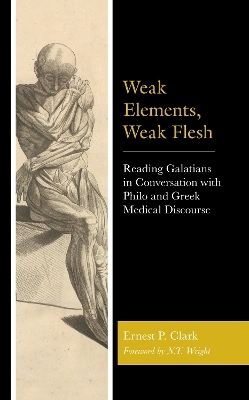
Weak Elements, Weak Flesh
Reading Galatians in Conversation with Philo and Greek Medical Discourse
Seiten
2023
Lexington Books/Fortress Academic (Verlag)
978-1-9787-1395-6 (ISBN)
Lexington Books/Fortress Academic (Verlag)
978-1-9787-1395-6 (ISBN)
In Weak Elements, Weak Flesh, Ernest Clark reinvigorates an ancient interpretation overlooked since the fourth century. Clark argues that when Paul writes “we too were enslaved under the elements of the world,” he is describing sin’s enslavement of all people through the material elements that compose and compromise their flesh.
In Weak Elements, Weak Flesh, Ernest Clark reinvigorates an ancient interpretation overlooked since the fourth century. Clark argues that when Paul writes “we too were enslaved under the elements of the world,” he means that the elements that compose the cosmos also compose and compromise the flesh, allowing sin to enslave human persons through their bodies (Gal 4.3). This book demonstrates that early Jews introduced the phrase στοιχεῖα τοῦ κόσμου to refer to the material elements: earth, water, air, and fire. Greek medicine understood these elements to mediate the bodily stimuli and desires which enslave the soul. In his philosophy according to the cosmic elements, Philo promotes the law of Moses as the effective way to be “redeemed from slavery” to the flesh and to attain righteousness. Paul’s epistle to the Galatians opposes this sort of “redemptive nomism.” Paul accepts that weak elements compose the weak flesh and that they mediate sinful stimuli and desires that lead to the actions of the flesh. However, he denies that the law can make people alive or righteous. Instead, Paul prescribes crucifixion with Christ and new life with the Spirit as the cure for sin’s infection of the flesh made of weak elements.
In Weak Elements, Weak Flesh, Ernest Clark reinvigorates an ancient interpretation overlooked since the fourth century. Clark argues that when Paul writes “we too were enslaved under the elements of the world,” he means that the elements that compose the cosmos also compose and compromise the flesh, allowing sin to enslave human persons through their bodies (Gal 4.3). This book demonstrates that early Jews introduced the phrase στοιχεῖα τοῦ κόσμου to refer to the material elements: earth, water, air, and fire. Greek medicine understood these elements to mediate the bodily stimuli and desires which enslave the soul. In his philosophy according to the cosmic elements, Philo promotes the law of Moses as the effective way to be “redeemed from slavery” to the flesh and to attain righteousness. Paul’s epistle to the Galatians opposes this sort of “redemptive nomism.” Paul accepts that weak elements compose the weak flesh and that they mediate sinful stimuli and desires that lead to the actions of the flesh. However, he denies that the law can make people alive or righteous. Instead, Paul prescribes crucifixion with Christ and new life with the Spirit as the cure for sin’s infection of the flesh made of weak elements.
Ernest P. Clark (PhD, University of St Andrews) is Director of Global Training with United World Mission.
Introduction
Chapter 1: The Term “Στοιχεῖα τοῦ Κόσμου” in Ancient Greek and Early Jewish Works
Chapter 2: The Concept of Enslavement to the “Στοιχεῖα τοῦ Κόσμου” in Ancient Greek and Early Jewish Sources
Chapter 3: The Argument for Redemptive Nomism in Philo’s Philosophy According to the “Στοιχεῖα τοῦ Κόσμου”
Chapter 4: The Flesh and Sin: Enslaved Under the Στοιχεῖα τοῦ Κόσμου
Chapter 5: The Law Against the Στοιχεῖα and the Flesh
Chapter 6: The Son and the Spirit Against the Στοιχεῖα and the Flesh
Conclusion
| Erscheinungsdatum | 02.12.2023 |
|---|---|
| Vorwort | N.T. Wright |
| Sprache | englisch |
| Maße | 159 x 240 mm |
| Gewicht | 590 g |
| Themenwelt | Geisteswissenschaften ► Philosophie ► Philosophie Altertum / Antike |
| Religion / Theologie ► Christentum ► Bibelausgaben / Bibelkommentare | |
| Religion / Theologie ► Christentum ► Kirchengeschichte | |
| ISBN-10 | 1-9787-1395-9 / 1978713959 |
| ISBN-13 | 978-1-9787-1395-6 / 9781978713956 |
| Zustand | Neuware |
| Haben Sie eine Frage zum Produkt? |
Mehr entdecken
aus dem Bereich
aus dem Bereich
Buch | Softcover (2021)
De Gruyter (Verlag)
CHF 45,90


